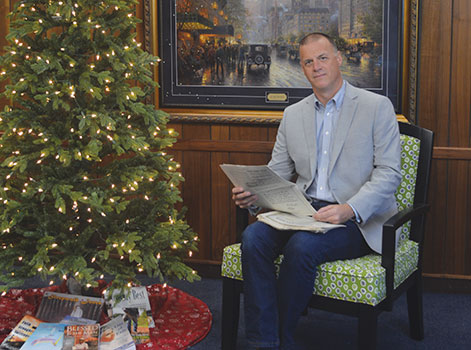New South Carolina Baptist Convention president Josh Powell is a church historian, pastor, and overseas seminary president. He will preside over the 200th annual meeting of the SCBC in November 2020, although the 200th anniversary will be celebrated in 2021.
Powell and his wife, Allison, are preacher’s kids and preacher’s grandkids. Both their dads are currently serving churches in Lake City and Lexington, and both their grandfathers were also pastors.
They have four children: Wilds, Levi, Macy Grace and Paton. He grew up in Lexington and met Allison at North Greenville University. After graduating from Southern Baptist Theological Seminary with an M.Div. degree, he started work on his Doctor of Philosophy degree in American church history. He has completed all course work and is in the process of writing his dissertation.
Powell has chosen “Legacy” as his theme for the 2020 annual meeting and is currently writing the updated history of the SCBC, which is scheduled to be released in conjunction with the 200th anniversary in 2021. He plans to keep the same format next year for the annual meeting: Monday evening and Tuesday. “When you make a change like this, you almost always have to do it for two years just to see if it’s going to work,” he said.
Being president is “kind of surreal,” he stated. “I consider it a great privilege, and one of the reasons is I really love what the Lord is doing with our convention staff. I am excited about the Kingdom Advance Plan and how Gary Hollingsworth and Jay Hardwick are leading this initiative.”
Powell, 44, continues to serve as president of Bobbili Baptist Seminary in Bobbili, India, which he founded in 2009 following his time in Kentucky. He visits the school once a year and keeps in contact with the faculty through FaceTime and other means. The Powells still own a house in India.
He came home to serve as the senior pastor of Lake Murray Baptist Church in January 2014 and soon began a revitalization campaign. Coming out of the time of revitalization, the church now gives 5 percent to the Cooperative Program, with plans “to increase it over the next couple of years,” Powell said.
He has also served as chair of the Racial Reconciliation Task Force. The concept of legacy relates directly to race relations as well as education and missions. Powell said, “When Richard Furman wrote the first bylaws, it stated that the South Carolina Baptist Convention meets to cooperate for the sake of education and missions. Those are the two pillars that our convention was founded on — education and missions — and that is the legacy we want to celebrate. At the same time, one of the first things Richard Furman did as president was to write the governor in defense of slavery.”
He observed that he wants the South Carolina Baptist Convention to recognize its legacy by accepting both the good and the bad. “We have to deal with the legacy that has been handed down to us. There are some things we may not want to celebrate, but I am going to work at celebrating what God has done through us in spite of our own failures and weaknesses,” he said. “Education and missions are still the number one thing for me, but the racial reconciliation conversation is of primary importance. Race is still an issue today, and it can create barriers. We need to admit there are certain barriers, and we need to work at tearing down those barriers.”
Powell believes we live in challenging times, and he sees his role as president as that of bringing the focus back to missions and education. “Everybody wants to know how their money is being used, and I think our mission boards need to spell out clearly their vision and mission. I think our convention has struggled for some years to prove what the mission and vision was. We lost a group of churches that just said they were going to continue to do their own thing. We need to win them back — by being clear. We need to operate not from a reactionary pose but from a proactive pose.”
He is encouraged that Southern Baptists are still sending money to missions and still pursuing the lost. “There are some things we need to clean up — and I believe the more we clean up those things and do what is right, the more people will see our vision. We need to be honest with who we are, clear about our vision and mission, and have the transparency to show people what we are doing,” he said.

